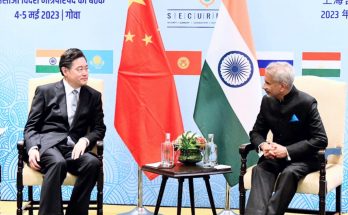Afghanistan and terror networks based in the region have emerged as a new source of bonding between India and China, the two Asian giants who are increasingly seeing the strategic advantages of cooperation in the wake of the pull-out of foreign combat troops from the violence-beset country.
Senior officials of India and China held the sixth round of counter-terrorism dialogue in Beijing April 11 against the backdrop of shifting equations and the intricate chessboard of reconciliation politics involving Afghanistan.
The Indian delegation led by Navtej Sarna, additional secretary in charge of international organisations in India’s foreign office, held wide-ranging talks with Qiu Guohong, Director General of the Department of External Security Affairs, in China’s Ministry of Foreign Affairs.
Why Afghanistan matters
The volatile situation in Afghanistan is understood to have figured prominently in the talks, imparting the latest round of counter-terror dialogue an added sense of purpose and urgency. The dialogue also underlined the possibilities of strategic trust building among the two Asian powers, which are often projected as rivals, on issues of common concern in the international arena.
Chinese analysts have welcomed the new thrust on the prospects of India-China cooperation in Afghanistan, which could lead to the setting up of a special mechanism of bilateral dialogue on the post-2014 Afghan situation.
Zhao Gancheng, a South Asia scholar at the Shanghai Institute for International Studies, noted positively that “now the two sides are increasingly aware of the common threat of international terrorist forces in South Asia and other regions as well.” “And, the two sides are facing the prospect of the U.S. and allies withdrawing from Afghanistan,” he told The Hindu, an Indian daily.
India’s stakes
Both India and China have their own reasons for forging a broad-based regional approach towards stabilising the post-214 Afghanistan. India has pledged over $2 billion in a wide array of reconstruction projects that range from building roads and dams to constructing the building of the Afghan parliament and a slew of grassroots projects. New Delhi’s stakes in the stability of Afghanistan are huge and have economic and strategic dimensions. Economically, India sees Afghanistan as a bridge to Central Asia and a potential hub of regional prosperity. From the security prism, Afghanistan is critically important for India as anti-India Taliban-affiliated terrorist networks, suspected to be supported by Pakistan, continue to operate with impunity from Afghanistan. Given Pakistan’s strategic establishment’s propensity to regard Afghanistan as its strategic backyard, India is concerned at the way the ISI-military establishment is trying to shape the outcome of the problematic reconciliation process in Afghanistan. It is against this backdrop the new initiative to forge dialogue with China, an all-weather friend of Pakistan, on Afghanistan has acquired an added traction.
China’s concerns
China’s security compulsions are driving it to seek a cooperative mechanism with India as it fears the spillover effects of the Taliban insurgency in its outlying regions like Xinjiang where some terror networks are suspected to enjoy incestuous linkages with the Taliban-al Qaeda combine in Afghanistan. Unlike India’s development-centric projects, China’s involvement is Afghanistan has so far been predominantly economic with major investments in copper mines and an energy deal, but with the post-2014 scenario in mind, China also sees it an opportunity to assert its regional pre-eminence by playing a more proactive role in shaping the future of Afghanistan. This was clear from the meeting between Chinese President Hu Jintao and Afghan President Hamid Karzai on the sidelines of the SCO summit in Beijing in June last year that culminated in the sealing of “strategic and cooperative partnership” between China and Afghanistan. This pact envisages a framework for stepping up bilateral engagement in diverse areas between the two countries against the backdrop of the withdrawal of international troops from the violence-torn country by 2014.
China’s major concern is to prevent the dominance of the Taliban-allied militant networks in a post 2014 dispensation in Kabul as it feels that a Taliban-ruled Afghanistan may give sanctuary to the separatist group, the East Turkestan Islamic Movement, led by ethnic Uighurs, and impinge on the stability of its border regions in Xinjiang. Against this backdrop, it is seeking wider regional cooperation, including with India, against the dominance of such militant networks in the region.
India, on its part, has been in the forefront of advocating a regional approach and the continued international assistance as it fears a Taliban takeover will lead to the installation of a hostile regime in Kabul which will be remote-controlled by Pakistan’s ISI-military establishment.
Regional Approach
The regional approach is now finding more backers, with India pursuing dialogues with Russia and Iran on the Afghan situation. Says the Shanghai-based analyst: “China and India, and also perhaps Russia, should closely watch the situation because the development of Afghanistan will exert enormous impact on all three parties,” he said. “Pakistan is also a crucial player post-2014. In Pakistan, the terrorism situation is very serious and a lot of extremist forces are very active. Putting all of this together, it is important for China, India and other countries to think about what we are going to do and what kind of cooperative mechanisms will be built up”.
In fact, India, China and Russia recently held talks in Moscow, which were followed by trilateral talks between China, Russia and Pakistan in Beijing, reflecting accelerated efforts by key players in the region to evolve a regional mechanism to ensure peace and stability in the post-2014 Afghanistan.
Strategic trust
Commenting on the India-China talks, Hong Lei, spokesperson of the Chinese Foreign Ministry enunciated Beijing’s stance: “The countries believe the situation in Afghanistan is closely connected to regional peace and security. The relevant parties’ dialogue on the Afghan issue can help them to enhance mutual understanding, deepen trust and step-up coordination.” This renewed focus on deepening strategic mistrust is poised to become an important trend in India-China relations over the next decade and will build upon the positive momentum generated by the talks Indian Prime Minister Manmohan Singh had with China’s new president Xi Jinping in Durban March 27, the first meeting between the leaders of the two countries since the decadal leadership transition in China, the world’s most populous country and the second largest economy.
Author Profile

- Manish Chand is Founder-CEO and Editor-in-Chief of India Writes Network (www.indiawrites.org) and India and World, a pioneering magazine focused on international affairs. He is CEO/Director of TGII Media Private Limited, an India-based media, publishing, research and consultancy company.
Latest entries
 India and the WorldMarch 3, 2024India-Denmark Connect: Red carpet for Indians to Red Sea cooperation
India and the WorldMarch 3, 2024India-Denmark Connect: Red carpet for Indians to Red Sea cooperation India and the WorldFebruary 17, 2024Munich Security Conference: Jaishankar, Blinken focus on Red Sea, Middle East
India and the WorldFebruary 17, 2024Munich Security Conference: Jaishankar, Blinken focus on Red Sea, Middle East India and the WorldFebruary 14, 2024Munich Security Conference report: Migration, war top security threats
India and the WorldFebruary 14, 2024Munich Security Conference report: Migration, war top security threats India and the WorldJanuary 23, 2024With “Ram to Rashtra” mantra, Modi consecrates Ram temple for national renewal
India and the WorldJanuary 23, 2024With “Ram to Rashtra” mantra, Modi consecrates Ram temple for national renewal







